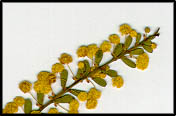South West Slopes Revegetation Guide
Acacia acinacea
Gold-dust Wattle
Select from the following for detailed images.
Species Information
| Synonyms |
A. rotundifolia |
| Common Names |
Gold-dust Wattle |
| Family |
Mimosaceae - Mimosa family. |
| Name Origin |
acinacea - curved, sword-like, possibly referring to coiled legumes or seed-bearing fruit. |
Specimen Data - CSU 914
| Location |
On the edge of Burrumbuttock Road heading towards Albury NSW. |
| Notes |
Zone: 55 Easting: 456997 Northing: 6075483 |
| Collector |
Earl, Gill, Kent, Kylie & Manders, Brett |
Date |
01/10/1999 |
| Determined By |
Kent, Kylie |
Date |
15/02/2000 |
South West Slopes Revegetation Guide Information
| Regional: |
Common west of the Olympic Highway. |
| Australia: |
NSW, Vic, SA. |
| Habitat: |
Woodland. A range of soils, chiefly sand. |
| Habit: |
Small spreading shrub 30 cm to 2 m high with arching branches, angled or flattened branchlets and hairy 'leaves'. |
| Similar Species: |
|
| Site Preference: |
|
| Characteristics: |
Fast-growing. Lifespan may be several decades. |
| Flowering: |
Golden-yellow, usually Aug-Oct. Profuse. |
| Seed Collection: |
Early Dec to mid Feb. Monitor closely as seeds released immediately or within 1-2 days of maturity. Often produces little seed. |
| Propagation: |
From scarified seed (+- 113 viable seeds per gram). Pour boiling or very hot water over seeds and soak for several hours before sowing. Also from cuttings. |
| Regeneration: |
From seed and suckers after fire, forming dense groundcover. Does not establish as readily as most wattles when direct seeded. |
| Timber: |
|
| Shade and Shelter: |
Useful low-level cover in windbreaks. |
| Land Protection: |
Legume - improves soil fertility by 'fixing' nitrogen. |
| Wildlife: |
Good habitat. Flowers are a nectar and pollen source for many native beetles, moths and butterflies. Insect-eating birds attracted. Seeds eaten by birds including parrots, native pigeons and quails, and invertebrates including ants (collections of seed often riddled with seed-eating insects). |
| Ornamental: |
Attractive for hedges, screens, rock gardens, under trees and in large tubs. Prune lightly after flowering to promote bushiness (heavy pruning promotes suckering). Self-seeds in garden. |
| Other: |
|
Note: The following information presented is only a guide, as plant characteristics vary depending on provenance (the plant's locality).
| Site/Preferred Habitat : |
well-drained soil |
| Rainfall(mm) : |
350 |
| Growth Rate : |
fast |
| Tolerates : |
frost; drought; moderate flooding |
| Resents : |
|
| Uses & Comments : |
windbreak; fixes nitrogen; wildlife; ornamental |
Return to Database List
